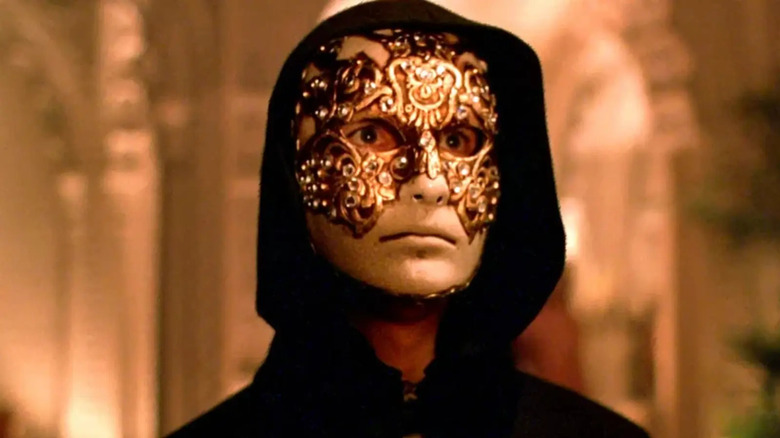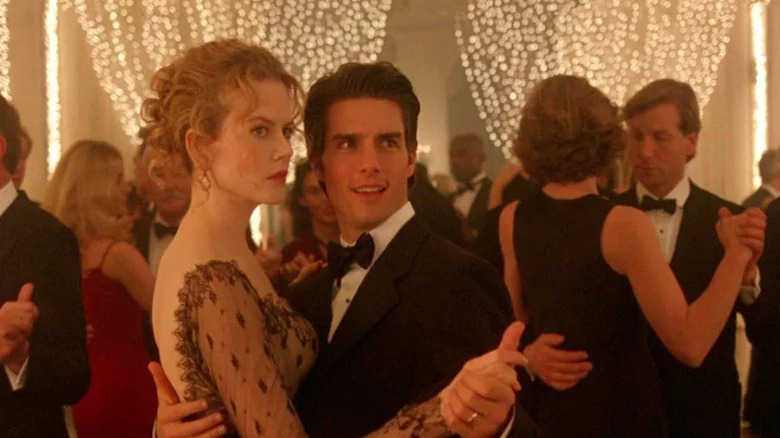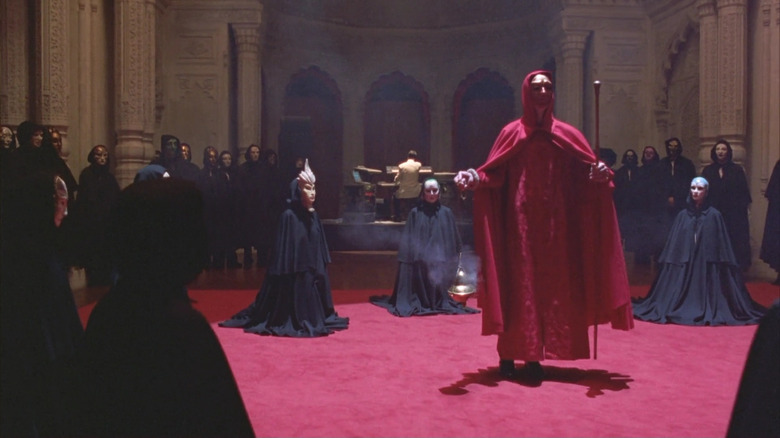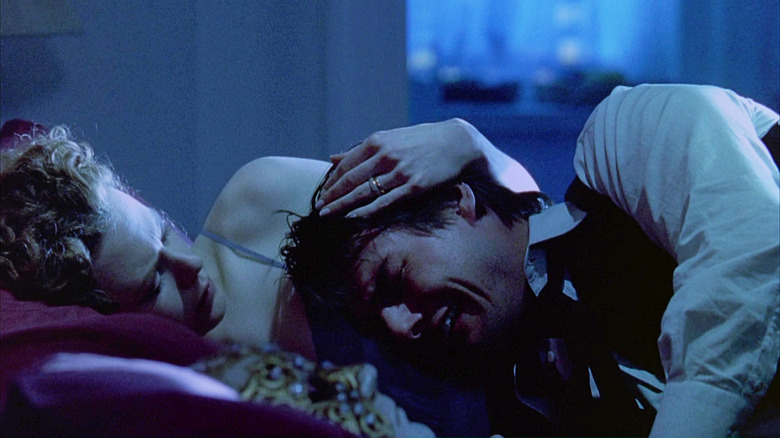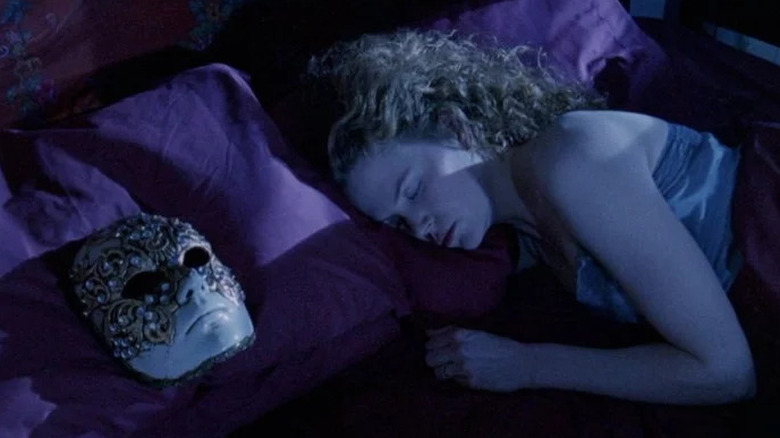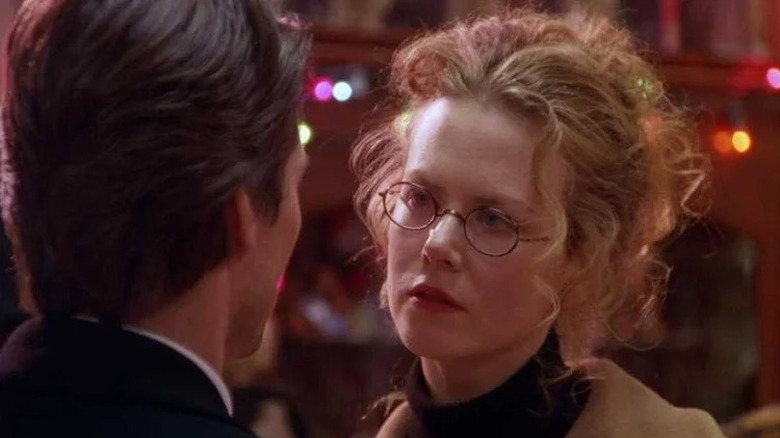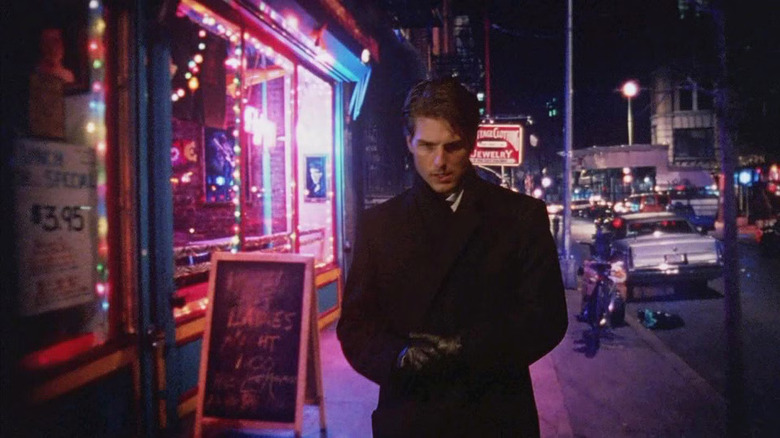Eyes Wide Shut Ending Explained: No Dream Is Ever Just A Dream
We may receive a commission on purchases made from links.
Stanley Kubrick's final film "Eyes Wide Shut" is loosely based on Arthur Schnitzler's novella "Traumnovelle (Dream Story)," and transfers the action from 1900s Vienna to the late 1990s in Greenwich Village. Stanley Kubrick was notorious for his exhausting shooting schedule, countless takes, and the psychological games he played on actors in order to extract their best performances. According to Vanity Fair, "[Kubrick's] theory was that once his actors bottomed out in exhaustion and forgot about the cameras, they could rebuild and discover something that neither he nor they expected." Kubrick tested this idea on his powerhouse stars Nicole Kidman and Tom Cruise in their roles of Dr. Bill and Alice Harford.
Kubrick's obsessive filmmaking techniques were well-suited for the high tension of his part-psychosexual thriller, part-marital drama about a doctor who goes on a labyrinthine journey through New York City. Now regarded as one of the best thrillers ever made, "Eyes Wide Shut" is a hypnotic film with many interpretative layers and meanings about sex, matrimony, and morality.
What you need to remember about the plot of Eyes Wide Shut
In the opening scene of "Eyes Wide Shut," Bill and Alice attend investment banker Victor Ziegler's (Sydney Pollack) lavish Christmas party. They both dance and flirt with strangers, and Bill is called to help a young woman named Mandy (Julienne Davis) — Ziegler's fling — who overdoses on a speedball. When Bill and Alice return home, they have sex and smoke weed. In their late-night haze, Alice reveals that she once daydreamed about leaving her family to run off with a handsome naval officer she spied on their Cape Cod vacation. She never acted on her desires, but Bill is baffled by the idea that his docile wife has her own urges and is not sexually passive. Bill is used to having all of the power in their relationship, so her admission leaves him bewildered and emasculated as he aimlessly wanders the city streets. Bill goes in search of his own adulterous experience and ends up at a secret society's masked orgy — interacting with sex workers, sleazy shop owners, and helpful strangers along the way.
Who was the woman who saved Bill?
The strangest scene of all is, naturally, the orgy scene, which Stanley Kubrick spent months researching and working with choreographer Yolande Snaith to create. Kubrick was hoping to toe the line between pornography and surrealism in the sexual movements. Despite wearing a robe and mask, Bill is exposed during the erotic ritual as an interloper, and a mysterious masked woman insists on taking his punishment.
The credits add to the confusion of who exactly this character is. Abigail Good is credited as the Mysterious Woman, but the next morning Ziegler reveals that he was involved in the orgy and the woman who saved Bill was Mandy — who died of a drug overdose that same night. However, Mandy is played by Julienne Davis. The velvety-voiced Cate Blanchett dubs the Mysterious Woman's dialogue. Ziegler claims Mandy's death was inevitable, dismissing her as a "junkie" who had it coming. Her door was locked from the inside, he says, thereby ruling out the secret society's involvement, but Bill has doubts.
Is Ziegler telling the truth? Like much of the film, it's hard to say. He tells Bill that he'd never sleep if he knew the identities of the underground organization's members, yet brushes off Mandy's act of saving Bill as a charade, then warns him to stay away for his own safety. Sydney Pollack's performance is slippery and venomous, making you unsure of Ziegler's true intentions. His well-to-do mask slips to reveal his sinister nature — a theme that will come full circle by the end of "Eyes Wide Shut." It seems highly unlikely that Mandy, who first saw Bill while slowly coming down from a high, could recognize him in a mask and cloak. But it's also far too coincidental that she died the very night of the orgy.
Why does Bill cry at the end of Eyes Wide Shut?
After losing his mask at the orgy, Bill finds it on his pillow beside his sleeping wife. An object that shields the truth sits in clear view, causing him to reveal the details of his journey. But who left it there? There are three popular theories. The first is that Alice found the mask and left it out in order to provoke a confession. In line with the film's illusory atmosphere, the mask could also be an imagined indication that Bill's brush with infidelity would always haunt him. Or perhaps members of the nefarious secret society placed it there as a threat. What matters more than who put it there is why it's there: as a bold reminder of how Bill hides from what is real.
This realization is exactly why Bill breaks down at the end of "Eyes Wide Shut." Stanley Kubrick's erotic odyssey is primarily about the nature of seeing: what is hidden in plain sight and what we choose not to see. Bill is in a state of denial about both his wife's sexual autonomy and his own temptations. His eyes may be open, but they are metaphorically shut to the truth of these secret desires. When he finally confronts them, the floodgates open.
Bill cries because of his doubts about the true closeness of his marital relationship. He cries because Alice dreams of making love with someone else and enjoying Bill's pain as he watches them. At the same time, Bill feels remorse for the many temptations he encountered, including nearly sleeping with a sex worker. Both characters stand on the edge of unfaithfulness, nearly plummeting into their darkest secrets and desires.
The mask symbolizes hidden truths
This theme of wilful ignorance in "Eyes Wide Shut" is symbolized by the object of the mask. The ornate masks worn at the orgy allow the secret society to remain anonymous and engage in salacious and disconnected sexual relations. These soulless copulations at the orgy mirror Bill and Alice's potential affairs: they would be nothing but meaningless physical encounters that could never replace the profound intimacy of their marriage — a genuine type of closeness that allows them to be their true selves. Bill wears a mask in order to infiltrate the private ceremony, but he also wears a figurative mask in real life to be an ideal husband and conceal his own sexual curiosity outside of his relationship with Alice. Meanwhile, Alice wears her own mask in the role of perfect wife and mother. As Bill discovers throughout his journey, society wears masks to conceal their true nature, such as Milich the costume shop owner who prostitutes his own daughter, or Ziegler, a wealthy man who wields his power for depraved and clandestine aims.
What is the message behind Eyes Wide Shut's final scene?
In the final scene of "Eyes Wide Shut," Bill and Alice take their daughter, Helena (Madison Eginton), shopping for Christmas toys, and Alice delivers the serious monologue:
"I think we should be grateful. Grateful that we've managed to survive through all of our adventures, whether they were real, or only a dream. Sure as I am that the reality of one night, let alone that of a whole lifetime can ever be the whole truth. And no dream is ever just a dream. The important thing is we're awake now and hopefully for a long time to come."
Bill and Alice both acknowledge that they have awakened from their dreams of infidelity just before turning their reality into a nightmare. They aim to work hard on their marriage so that they never face such tribulations again. "Eyes Wide Shut" recognizes how earth-shattering disloyalty can be, even if it just occurs in your mind. Dreams and the subconscious are powerful, and have the ability to transform our waking lives.
Alice also proposes that there is another thing that they must do as soon as possible: "F***." The blunt delivery is a bit comical, but it comes from an honest place. Alice is not suggesting they engage in the kind of unfeeling coitus Bill observed at the orgy, but a raw physical intimacy that can only come from a deep, emotional bond forged over many years of commitment. Having sex will help them find their connection to one another again.
Why does Eyes Wide Shut feel like a dream?
Have you ever had one of those dreams that feels so real it leaves you wondering if it really happened when you wake up? Or have you ever had a dream that was so violent or sexual that it jolts you awake, questioning what's buried deep inside you? Was your subconscious trying to tell you something? These uneasy nighttime visions usually linger with you throughout the rest of the day. Stanley Kubrick masterfully recreates this sensation in "Eyes Wide Shut." The lengthy, drawn out scenes unveil images that are so uncanny, you question whether or not they are actually there, such as a teenage girl suddenly appearing in her underwear chased by two older men at the costume store. Jocelyn Pook's score, with its repetitive yet plodding piano, the "thunk" sound of a single note over and over again, creates the sense that something ominous is coming, but never reaches that climax.
"Eyes Wide Shut" feels like a dream because, so often, we are sleepwalking through life, caught in an endless cycle of mundane routines. This can happen, especially when you've been in a romantic relationship for a very long time. That's how it feels for Bill and Alice's marriage, which is why the idea of stepping out with someone else shakes them to the core. On the other hand, those with immense wealth and power have nothing holding them back from acting on their darkest desires, allowing them to turn their dreams into reality. What is real? What is an illusion? We're never exactly sure in Stanley Kubrick's final and perhaps most cryptic masterpiece.
"Eyes Wide Shut" is an incredible drama that, as /Film's Bryan Young writes in his 20th anniversary revisiting of the film:
...speaks to the complicated nature of relationships and how fragile they can be and how communication and honesty can work to heal those things. It's also a story about the constant temptation in a world that over-emphasizes sex.
The film's dreamy nature may be confusing, but what is important to remember is that ultimately "Eyes Wide Shut" is about the reconciliation of a couple who intentionally blinded themselves from the hard truths of their insecure relationship.
